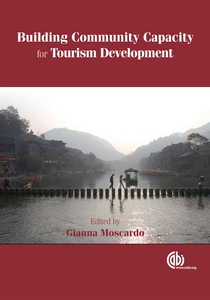Linking a sense of place with a sense of care: overcoming sustainability challenges faced by remote island communities
Walker, Kaye (2008) Linking a sense of place with a sense of care: overcoming sustainability challenges faced by remote island communities. In: Moscardo, Gianna, (ed.) Building Community Capacity for Tourism Development. CABI, Oxfordshire, UK, pp. 41-59.
![[img]](https://researchonline.jcu.edu.au/26573/2.hassmallThumbnailVersion/26573_Walker_2008_cover.jpg)
|
Image (JPEG) (Book Cover)
- Published Version
Download (270kB) |
|
|
PDF (Published Version)
- Published Version
Restricted to Repository staff only |
Abstract
This chapter examines how ecotourism operators may enhance communities' awareness of negative and positive tourism impacts as an inherent function of their own operational sustainability and accreditation processes. It is argued that one way the ecotourism experience could have some benefit is to facilitate a sense of care, regarding the sustainability of the local population, among the ecotourism operators, if only in a purely economic sense. In ecotourism operations, the participants' understanding and awareness of their environmental and cultural experiences is principally facilitated through the process of interpretation. Two models were developed to facilitate, or at least provide, the basis to create a psychological environment for the participants to consider their sense of care for the communities they encountered. It also seemed apparent that this model would be far more effective if it could be incorporated into the ecotourism process, integrating the community into an operational and administrative framework. This could potentially improve the community's capacity to ensure its sustainability because it had become a component formally embedded in the tourism process. Both the Value Model of Interpretation-I (VMI-I), and a Sustainable Tourism Framework, were developed. These models were applied in two remote destinations. The first aspect to be discussed involves investigating the interpretive capacity of Expedition Cruises to facilitate a sense of care among its participants in a remote, but more accessible island involving a marginalized community, Easter Island. It also draws from a study involving the Traditional Owners (TOs) of a remote group of islands in the Great Barrier Reef called the Flinders Island Group. Despite the different outcomes of the two studies, they both indicate that a sense of place approach in the interpretive function of the ecotourism operation did appear to contribute to the following three aspects: (1) determining the appropriateness of the tourism product as the guides and others involved in tourism on the islands recognized the limitations of the tour experience and were able to suggest improvements or operational imperatives to enhance the outcomes; (2) understanding the aspirations and desires of the local community prompted their own suggestions and the development of practices for appropriate impact management, and the communication and liaison of these with tourism operators; and (3) responding to the value the community assigned to places in which they live enabled tourism participants to consider the negative impacts upon cultures and environments in a global perspective. To ensure that the community and its values are incorporated into the administrative process of sustainable tourism, thus achieving one of the earlier stated aims to integrate remote island communities into an administrative or operational process in order to contribute to the capacity for sustainability, it is imperative that this approach is linked into established operational agendas for ecotourism operators through their accreditation processes. If the Sustainable Tourism Framework is considered as an operational framework and its application coordinated with the use of the VMI-I as an assessment tool as well as an interpretive tool, then it is possible to compare the personal values and environmental awareness identified by the tourists with those identified by the community as being significant. This takes the environmental accreditation programmes currently in place to an extended level of application and usefulness.
| Item ID: | 26573 |
|---|---|
| Item Type: | Book Chapter (Research - B1) |
| ISBN: | 978-1-84593-447-7 |
| Keywords: | remote island communities; ecotourism; community awareness |
| Date Deposited: | 04 Jun 2013 00:05 |
| FoR Codes: | 15 COMMERCE, MANAGEMENT, TOURISM AND SERVICES > 1506 Tourism > 150699 Tourism not elsewhere classified @ 100% |
| SEO Codes: | 90 COMMERCIAL SERVICES AND TOURISM > 9003 Tourism > 900399 Tourism not elsewhere classified @ 100% |
| Downloads: |
Total: 1071 |
| More Statistics |




